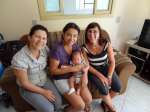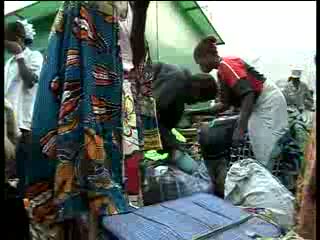Building a bridge from Brazil to Africa
News Stories, 10 February 2005

SAO PAOLO, Brazil (UNHCR) – Seated in his São Paulo apartment among bongos, tambourines and paintings of savannah sunsets, Mikanda*, a soft-spoken 38-year-old, tells the story of his arrival alone in Brazil from Angola 10 years ago. A young man in search of religious learning and a future as a priest, he did not know then that in this new society he would embark on a completely different mission.
Soberly dressed in suit and tie and looking very serious, Mikanda recalls that he was in Brazil when he learnt that his father had been imprisoned back home. A member of Angola's ruling MPLA party (Popular Movement for the Liberation of Angola), his father was accused of sympathizing with UNITA (Union for the Total Independence of Angola) rebels.
Mikanda organized a campaign in São Paulo for his release, and gathered hundreds of signatures. He wrote an article on politics and the war in Angola, which was published in Folha de São Paulo, one of Brazil's most important dailies.
"I then found out from friends in Angola that the Angolan Ambassador in Brazil was indignant, and that I had been declared a persona non grata in my country," he says. "That also had to do with the fact that while in Angola I had participated in a party which worked for peace, and had refused to join the army."
Mikanda applied for asylum in Brazil in October 2000, and was granted refugee status by the Brazilian refugee committee, CONARE. This was one of the most violent periods in Angola's civil war, and CONARE recognized another 300 Angolans at the same time, applying the Cartagena Declaration.
The Declaration widens the definition of refugees to also include those who have fled their countries because they were threatened by generalized violence or internal conflicts, among other cited circumstances seriously disturbing public order.
In the meantime, Mikanda had changed academic course, earning a degree in Economics from the University of San Francisco in São Paulo. It was his decision to join the newly formed African Friends and Students League however, that would lead him to become an artist, a teacher and policy advocate.
The League was born in 1996, when some 400 students mostly from sub-Saharan Africa but also from Brazil, Cuba, Morocco and Algeria got together in the midst of a growing Black-consciousness movement in Brazil. The movement is spearheaded by lawmakers, human rights activists, painters, musicians and just about anybody eager to carve out a larger role for Brazil's black population in the country's political and social life.
According to different sources, about 45 percent of the population is of direct or partial African descent. The Afro-Brazilian population is disproportionately affected by poverty and studies show that child labour, illiteracy and infant mortality are higher among this group.
In recent years the government has introduced a number of different measures to promote racial equality, including a federal government quota system for hires and race quotas in several state universities. It also became mandatory in 2003 for all public schools to include the history of Africa and black culture in Brazil in its curricula.
The African Friends and Students League is one of the non-governmental institutions playing an active role in the Black-consciousness movement. Mikanda quickly made its mission his own: promoting African culture in Brazil to strengthen ties between this Latin American country and the African continent.
He started by buying an amplifier and printing t-shirts with a small loan which he got from Cáritas, UNHCR's partner in Brazil. He used the materials when he went to schools to tell African stories, and soon decided to offer live music as well. "And that's how we started playing music," he remembers.
Today, he is the League's President, and has also set up an office, "Moments of Africa", which offers different aspects of African culture. Visitors can partake in theatrical presentations, dances – Kizomba or other dances mostly from southern and western Africa – live music, story-telling, film presentations and food tasting. It is a vivid experience not least because of the bright batik and other traditional clothing worn by the performers, including Mikanda himself.
This proud Angolan is motivated not only by his strong desire to see Brazil integrate more fully its African population, but also by the conviction that if Brazilians get a close experience of African culture, they are more likely to take an active stand on issues of importance on that continent.
"Why did Brazilians not organize a single march for peace in Angola? When persons have really experienced a taste of Africa, sung to its tunes and danced to its rhythm, they react differently. In times of war on our continent, this is also reflected and may have an impact on Brazil's foreign policies," he says.
Mikanda has been invited to give many lectures and to organize public events hosted by companies, clubs and schools all over the country. The League has also recently developed an educational programme to train 80 school teachers in African culture, history and oral tradition – an aspect of the culture Mikanda is particularly interested in transmitting, "because it is just as important for Afro-Brazilians to have access to their ancestral past".
In November 2004, the League was invited to take charge of a 20-day event in São Paulo's largest metro station to mark the city's 450th anniversary. Afternoon passengers were treated to different activities every day, from a South African fashion show to a talk on African hip-hop culture.
Full of energy and hope, Mikanda has big plans for the future. "The market for Africa in Brazil is huge, I would like to set up six new offices like the one in São Paulo. This work helps build a relationship between our peoples and establishes a solid base for peace."
* Not his real name.
By Wellington Carneiro in Brasilia, Brazil
and Nazli Zaki in Buenos Aires, Argentina































